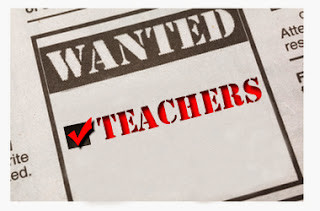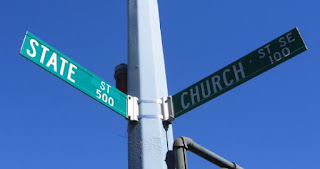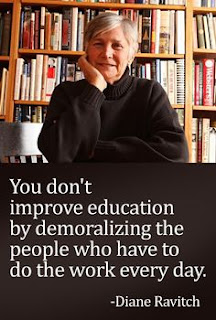A teacher shortage, or not?
NOT A TEACHER SHORTAGE
I've often posted teacher shortage rants on this blog, and I'll continue to do so, but the phrase needs some nuance. Peter Greene calls it...
...an exodus, a slow-motion strike, or a wave of teachers responding to the old, “If you don’t like it, then get out” with a resounding, “Okay, then.”The point he makes is that there are enough teachers (at least for the time being) but the jobs in education are not attractive enough to get sufficient numbers of qualified people into classrooms. This is not new.
There Is No Teacher Shortage. So Why Is Everyone Talking About It?
...it’s a short step to solutions like those proposed in Idaho and other states that have simply lowered the bar so that no formal education training is required to take over a classroom...
All of these sorts of solutions rest on the premise that there is a teachers shortage, that the mine has been stripped of every nugget, that there is no crop to harvest and we must therefor change the definition of what we’re looking for. All of these solutions rest on a dogged determination to misdiagnose the problem.
...There is no teacher shortage. There’s a teacher recruitment and retention problem. There’s a “making the job attractive enough to draw in the people we want” problem. There is a problem that requires a careful, thoughtful diagnosis. There are policy and political leaders who see the current situation as an opportunity to be exploited rather than a problem to be solved. Those are not the voices we should be listening to right now.
WHERE WILL TOMORROW'S TEACHERS COME FROM?
Greene writes about the broken teacher pipeline in Pennsylvania. A similar situation exists in Indiana. Fewer students than in the past are going into education and fewer education students than in the past are actually entering the teaching profession. The situation is worse with college students of color. So if we're not in the midst of an actual teacher shortage, by the numbers, we will be soon.
In 1975, nearly 22% of the nation's college students studied education. By 2015 that number had dropped to less than 8%. The percentages for women, the majority of public educators, are even greater going from 32% in 1975 to less than 11% in 2015. And things haven't changed lately either.
Just 1 in 6 Indiana college students who study education become teachers, report finds
Only 1 in 6 students who pursued bachelor’s degrees in education at state colleges and universities ended up working as teachers, according to a new report on Indiana’s teacher pipeline that followed students who entered college from 2010 to 2012.Why are students avoiding going into education? Why are students with education degrees avoiding going into the classroom? The answer is the same as it's been for decades.
The outcomes were even starker among students of color: Just 5% of Black students who entered education programs went into teaching in Indiana classrooms, according to the study from the Institute of Education Sciences, the research arm of the U.S. Department of Education.
The report followed students enrolled in education programs at Indiana’s public colleges and universities to see how many received degrees, were licensed, and got jobs in teaching.
Of the roughly 11,000 students who pursued bachelor’s degrees in education, just 16% eventually received licenses and found jobs in Indiana public schools
Money and respect, not necessarily in that order.
THE TEACHER PAY PENALTY
Everyone knows that teachers don't earn enough for the work that they do...everyone, that is, except right-wing pundits and legislators who consider the job "a parttime babysitting job."
"Teachers get the whole summer off and get paid for it."
"Teachers only work until 3 o'clock."
You get the picture. No amount of reasoning or facts will change their minds. To paraphrase Jonathan Swift,
You cannot reason people out of positions they didn’t reason themselves into.To make matters worse, there is a significant gap between the salaries of teachers and the salaries of other professionals with similar education. This gap, which is continuing to grow, is referred to as the teacher pay penalty and it, too, has been around for quite a while.
Does the pay penalty exist because teaching is traditionally "women's work" and women in the US still, after all these years, make 72 cents for every dollar that men make? Absolutely.
Does the pay penalty continue to grow because Republican legislators in state houses in Indiana and around the county are transferring funding for public education to private and charter schools? Absolutely.
Does the pay penalty continue to grow because those same legislators hate teachers unions and are doing their best to "bust" the unions? Absolutely
The teacher pay penalty has hit a new high
Simply put, teachers are paid less (in weekly wages and total compensation) than their nonteacher college-educated counterparts, and the situation has worsened considerably over time.Are Republican legislators and their donors interested in improving education outcomes in order to foster future economic stability of workers, their families and communities?
Prior to the pandemic, the long-trending erosion in the relative wages and total compensation of teachers was already a serious concern. The financial penalty that teachers face discourages college students from entering the teaching profession and makes it difficult for school districts to keep current teachers in the classroom. Trends in teacher pay coupled with pandemic challenges may exacerbate annual shortages of regular and substitute teachers.
Providing teachers with compensation commensurate with that of other similarly educated professionals is not simply a matter of fairness but is necessary to improve educational outcomes and foster future economic stability of workers, their families, and communities across the U.S.
Good question.
TO SOME, IT'S STILL A CALLING
Still, not every teacher is dissatisfied and leaving the profession. NEA, trying to post some good news for a change, posted this about teachers who were staying in their classrooms despite the difficulties.
Take this Job and Love It: Why Educators Stay
Kevin Adams has moments when he considers packing up his classroom and starting a new career...
...But then his thoughts go back to his students. He remembers what it’s like to watch them grow and evolve, to see the sparks of understanding light up their faces, to interact with their spirited young minds, and even to hear their silly jokes. There’s joy and fulfillment in each day at his middle school— enough of it to tip the scales. And so he stays.
“That is the number one reason I’m still here, hands down,” Adams says. “It’s the kids.”
🚌🚌🚌


























